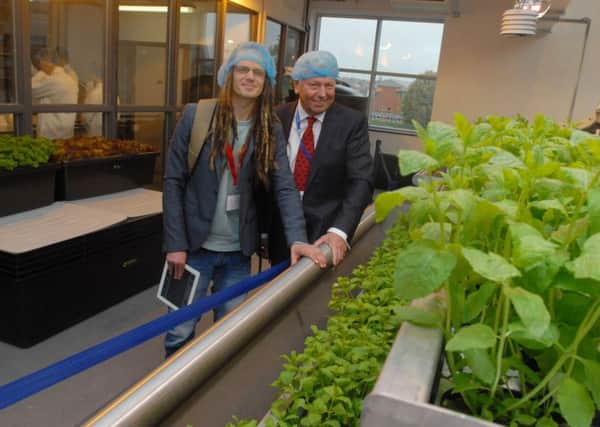College vertical farm to help feed homeless


Wigan University Technical College is the proud owner of Britain’s only “vertical farm” and process hall. When installed three years ago they were to be used to train up would-be engineers to learn the entire food creation process from seed to container.
But the UTC has struggled to attract the desired number of students to date to get it all running very often.
Advertisement
Hide AdAdvertisement
Hide AdThere are plenty of other plans from millionaire backer Martin Ainscough, whose brainchild the UTC was, in order to turn round the college’s fortunes.
But his first mission is to help the borough’s neediest.
Students, helped by Groundwork Trust Prince’s Trust participants and experts will grow and process various foods to produce around 60 gallons of soup a week: or, to put it in drinkable sizes, around 500 half-litre pouches. And Mr Ainscough intends to the give the soup, free of charge, to the Wigan-based charity The Brick.
Some of it will be given out free to the homeless, some will be sold at discount at its food banks and also given to volunteers.
Mr Ainscough, who recently received a CBE for his services to charity and is a major supporter of the Prince’s Trust and the neighbouring Wigan Youth Zone, said he was keen to forge partnerships.
Advertisement
Hide AdAdvertisement
Hide AdHe added: “The vertical farm is a great piece of machinery. They are used a lot abroad already, but this is the only one in this country and it has been a great shame that it hasn’t been put to use more often since it was installed.
“With this in mind I want it to be used to make soup for a charitable cause and there are few more deserving than The Brick.
“I think businesses, charities and those in training should work together far more often.
“We put the equipment to good use, we educate people and we help those less fortunate. The farm can grow the equivalent of two acres of greenhouse produce.”
Advertisement
Hide AdAdvertisement
Hide AdMr Ainscough said that some of the produce for the soup will come from the My Life charity project at Standish (which he also founded) and talks were under way with other organisations to sponsor the UTC to produce the vegetables.
Kathleen Pitt, chief executive of Queen’s Hall Action on Poverty which runs The Brick, said: “Martin Ainscough is keen to get this soup facility up and running and we are equally keen to receive the soup! It would be given out at the food bank at the Brick in Rowbottom Square.
“We also have a kitchen and we provide a lunch for the people who work with us. We have a community warehouse where we help people to learn how to get into employment and we have a kitchen and cafe there too. We could also sell the soup in our charity shop. We cannot wait for the project to start.”
Colin Greenhalgh, programme director, employment and skills at the Groundwork Trust, said: “We run a Prince’s Trust programme, part of which includes a community project which benefits the local community. This soup production idea links up perfectly with the UTC. It helps them develop new skills and confidence and that looks good on a CV and it is good to give something back to society.
Advertisement
Hide AdAdvertisement
Hide Ad“Initially it would be young people learning about food production and distributing the soup. But in the longer term it might also be about growing produce as well because we run a number of community allotments and gardens. This idea is perfect for the community project and it’s right on our doorstep.”